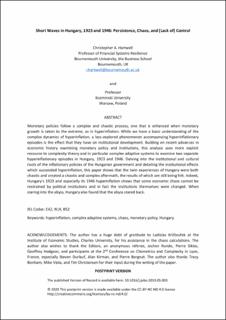Please use this identifier to cite or link to this item:
https://doi.org/10.21256/zhaw-22613Full metadata record
| DC Field | Value | Language |
|---|---|---|
| dc.contributor.author | Hartwell, Christopher A. | - |
| dc.date.accessioned | 2021-06-10T14:27:11Z | - |
| dc.date.available | 2021-06-10T14:27:11Z | - |
| dc.date.issued | 2019 | - |
| dc.identifier.issn | 0167-2681 | de_CH |
| dc.identifier.uri | https://digitalcollection.zhaw.ch/handle/11475/22613 | - |
| dc.description.abstract | Monetary policies follow a complex and chaotic process, one that is enhanced when monetary growth is taken to the extreme, as in hyperinflation. While we have a basic understanding of the complex dynamics of hyperinflation, a less-explored phenomenon accompanying hyperinflationary episodes is the effect that they have on institutional development. Building on recent advances in economic history examining monetary policy and institutions, this analysis uses more explicit recourse to complexity theory and in particular complex adaptive systems to examine two separate hyperinflationary episodes in Hungary, 1923 and 1946. Delving into the institutional and cultural roots of the inflationary policies of the Hungarian government and detailing the institutional effects which succeeded hyperinflation, this paper shows that the twin experiences of Hungary were both chaotic and created a chaotic and complex aftermath, the results of which are still being felt. Indeed, Hungary's 1923 and especially its 1946 hyperinflation shows that some economic chaos cannot be restrained by political institutions and in fact the institutions themselves were changed. When staring into the abyss, Hungary also found that the abyss stared back. | de_CH |
| dc.language.iso | en | de_CH |
| dc.publisher | Elsevier | de_CH |
| dc.relation.ispartof | Journal of Economic Behavior & Organization | de_CH |
| dc.rights | https://creativecommons.org/licenses/by-nc-nd/4.0/ | de_CH |
| dc.subject | Chaos | de_CH |
| dc.subject | Complex adaptive system | de_CH |
| dc.subject | Hungary | de_CH |
| dc.subject | Hyperinflation | de_CH |
| dc.subject.ddc | 332: Finanzwirtschaft | de_CH |
| dc.title | Short waves in Hungary, 1923 and 1946 : persistence, chaos, and (lack of) control | de_CH |
| dc.type | Beitrag in wissenschaftlicher Zeitschrift | de_CH |
| dcterms.type | Text | de_CH |
| zhaw.departement | School of Management and Law | de_CH |
| zhaw.organisationalunit | International Management Institute (IMI) | de_CH |
| dc.identifier.doi | 10.1016/j.jebo.2019.05.003 | de_CH |
| dc.identifier.doi | 10.21256/zhaw-22613 | - |
| zhaw.funding.eu | No | de_CH |
| zhaw.originated.zhaw | No | de_CH |
| zhaw.pages.end | 550 | de_CH |
| zhaw.pages.start | 532 | de_CH |
| zhaw.publication.status | acceptedVersion | de_CH |
| zhaw.volume | 163 | de_CH |
| zhaw.embargo.end | 2022-05-31 | de_CH |
| zhaw.publication.review | Peer review (Publikation) | de_CH |
| zhaw.webfeed | W: Spitzenpublikation | de_CH |
| zhaw.author.additional | No | de_CH |
| zhaw.display.portrait | Yes | de_CH |
| Appears in collections: | Publikationen School of Management and Law | |
Files in This Item:
| File | Description | Size | Format | |
|---|---|---|---|---|
| 2019_Hartwell_Short-Waves-Hungary.pdf | Accepted Version | 964.01 kB | Adobe PDF |  View/Open |
Show simple item record
Hartwell, C. A. (2019). Short waves in Hungary, 1923 and 1946 : persistence, chaos, and (lack of) control. Journal of Economic Behavior & Organization, 163, 532–550. https://doi.org/10.1016/j.jebo.2019.05.003
Hartwell, C.A. (2019) ‘Short waves in Hungary, 1923 and 1946 : persistence, chaos, and (lack of) control’, Journal of Economic Behavior & Organization, 163, pp. 532–550. Available at: https://doi.org/10.1016/j.jebo.2019.05.003.
C. A. Hartwell, “Short waves in Hungary, 1923 and 1946 : persistence, chaos, and (lack of) control,” Journal of Economic Behavior & Organization, vol. 163, pp. 532–550, 2019, doi: 10.1016/j.jebo.2019.05.003.
HARTWELL, Christopher A., 2019. Short waves in Hungary, 1923 and 1946 : persistence, chaos, and (lack of) control. Journal of Economic Behavior & Organization. 2019. Bd. 163, S. 532–550. DOI 10.1016/j.jebo.2019.05.003
Hartwell, Christopher A. 2019. “Short Waves in Hungary, 1923 and 1946 : Persistence, Chaos, and (Lack of) Control.” Journal of Economic Behavior & Organization 163: 532–50. https://doi.org/10.1016/j.jebo.2019.05.003.
Hartwell, Christopher A. “Short Waves in Hungary, 1923 and 1946 : Persistence, Chaos, and (Lack of) Control.” Journal of Economic Behavior & Organization, vol. 163, 2019, pp. 532–50, https://doi.org/10.1016/j.jebo.2019.05.003.
Items in DSpace are protected by copyright, with all rights reserved, unless otherwise indicated.